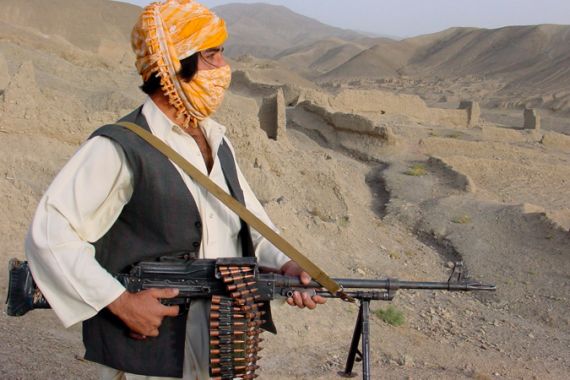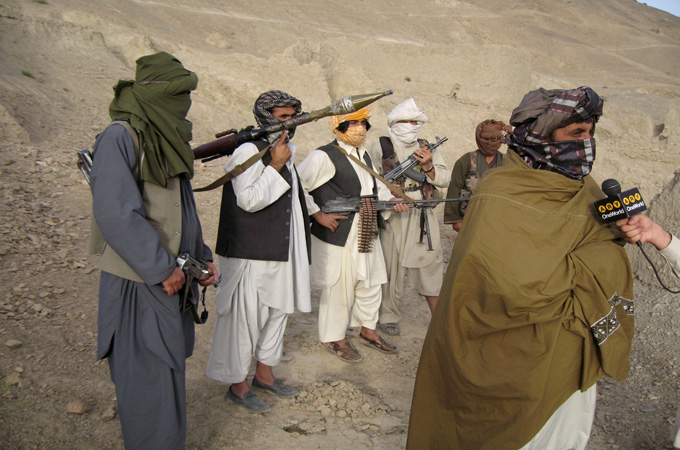The road map to the Afghan endgame
Some Taliban may set up an office in Doha, but will all Americans actually leave Kabul?

 |
| Taliban spokesman Zabiullah Mujahid said the Taliban would be opening a political office in Qatar [EPA] |
New York, New York – Once upon a time they favoured Dubai – their smuggling Mecca. Now the Taliban go-to destination of choice will be Doha.
So the Taliban will open a political office in Qatar to be engaged in negotiations “with the international community”, according to Taliban spokesman Zabiullah Mujahid.
Afghan president Hamid Karzai wanted the office to be either in Turkey or Saudi Arabia. The Obama administration applied some screws – Karzai had to accept Qatar. So much for the “sovereignty” of the man informally known as the mayor of Kabul.
The Doha operation was strictly a US, German, Qatari and Taliban “representatives” affair. Doha was specifically picked by the Obama administration. The concept of a reward was clear – as in Qatar’s solid, unconditional partnership with NATO, which, by the way, is spectacularly losing a war in Afghanistan.
In a crucial electoral year, the White House now expects to accumulate some extra foreign policy dividends by enticing the Taliban to the table (a lavish Kabuli rice banquet at the Ritz-Carlton, perhaps?) But what’s the real story behind the spin?
Stuff those drones, buddy
As in all things AfPak, wishful thinking remains the law of the land. Washington has been abuzz with “secret discussions between US and Taliban officials”.
Not so secret after all. Washington wanted the Taliban to renounce all weaponry. The Taliban said “no”. Washington wanted the Taliban to renounce any links to al-Qaeda – and in this case Taliban prisoners would be released from Guantanamo. The Taliban said “let’s talk”.
Wishful thinking also pervades the notion that the political office in Doha will somewhat isolate Pakistan from the Taliban leadership. Mullah Omar, as every grain of sand in the Balochi deserts know, lives in Quetta, undisturbed by ubiquitous US surveillance.
Even though Islamabad was not consulted about the Doha office, Washington assumes the Pakistani ISI is not monitoring each one of these steps – as it keeps monitoring its ironclad Taliban connections.
Predictably, Tehran was also snubbed by Washington. The architects of the Doha strategy must have been mesmerised by Tom Cruise escalating Burj Dubai in the latest installment of Mission Impossible to believe both Pakistan and Iran could be sidelined of any meaningful Afghanistan endgame.
|
Taliban to open office in Qatar |
Moscow – also not consulted – is not buying the Doha strategy. The same goes for Beijing – as in this piece quoting Afghan analysts. And with US-Pakistan relations reaching new abysmal lows over repeated Washington blunders, Pakistani military spokesman General Athar Abbas has already set the new groove; “From here on in we want a very formal, business-like relationship.
“The lines will be drawn. There will be no more of the free run of the past, no more interpretation of rules. We want it very formal with agreed upon limits.”
Translation; Washington can kiss its “signature strike” drone war over the tribal areas goodbye.
Then enter the current visit to China of Pakistan’s army chief Ashfaq Kayani – who until virtually yesterday was a Pentagon darling. That points to Beijing and Islamabad/Rawalpindi intimately connecting their strategy in relation to further developments in Doha.
No more Mission Impostor
It will be fascinating to watch the reaction of these Taliban envoys when faced with the (blasphemous?) IM Pei-designed Museum of Islamic Art in Doha. But who exactly are these people?
Well, at least they won’t be able to pose as impostors – as the one who killed Afghan political icon Burhanuddin Rabbani in September 2011 with a suicide bomb disguised in his turban.
Or the fake Taliban “negotiator” who bagged a fistful of dollars from US and UK intelligence in 2010.
But what about the Supreme Leader, Mullah Omar?
He’s not exactly booking a flight on Qatar Airways. On the contrary; acting on one of his directives, last Sunday the Afghan and Pakistani Taliban have formed a five-member Shura advisory council.
Their key decision: the Pakistani Taliban will no longer be fighting the Pakistani army, as in suicide bombings and kidnappings in the tribal areas. They will focus their firepower on the occupying US/NATO forces in Afghanistan.
Mullah Omar’s message was unambiguous: “Convey my message to the Pakistani Taliban that you have forgotten the real purpose, which is to fight the invading forces in Afghanistan and liberate it from their occupation.”
Only one factor could possibly allow Mullah Omar to form a united AfPak front to launch the umpteenth summer offensive against US/NATO; the Pakistani ISI promising the Pakistani Taliban it would not attack them anymore – and neither would US drones.
So if a united AfPak Taliban is getting ready to rumble and control more Afghan land in 2012 than that which they already do, what about those Taliban trekking to Doha?
There’s no better clue to Taliban intentions than one of their official declarations; “The stance of [the] Islamic Emirate of Afghanistan from the beginning has been to bring about the end of the invasion of Afghanistan and to let the Afghans establish an Islamic government of their own choosing which does not pose danger to anyone.”
In Taliban talk, “does not pose danger to anyone” means no more safe bases for al-Qaeda in Afghanistan. That’s about all Washington will get – if those Taliban are released from Guantanamo, of course.
|
“You have forgotten the real purpose, which is to fight the invading forces in Afghanistan and liberate it from their occupation.“ – Mullah Omar |
As for the Taliban trekking to Doha, these will be the so-called “good Taliban” – a mirage Washington has been entertaining for years. Most of this bunch lives in Kabul – protected by Karzai’s elaborate made-in-USA security apparatus.
After all, there is no monolithic “Taliban” – it’s a Pashtun-style coalition of the willing.
The Haqqani network, for instance, won’t be flying to Doha. On the other hand the Gulbuddin Hekmatyar faction – via his son-in-law – is already talking to NATO hands in Kabul.
Once again, it’s instructive to go back to the official Islamic Emirate’s take on “negotiations”; “The perturbing reports spread by some news agencies and Western officials about negotiations have no reality and are strongly rejected by Islamic Emirate of Afghanistan.”
Then there’s the fascinating case of former Taliban commander-in-chief: Mullah Mohammed Fazl.
Will the Americans drop him in Kabul or directly in Doha – straight from Guantanamo? From butcher of Shia Hazaras in Afghanistan to Guantanamo resident and then senior Islamist politician – now that’s the career move of the ages.
All that if Mullah Fazl is back – and that’s a major “if”. Some kind of panic has already set in Washington, as in serial denials there’s any deal over the release of Taliban prisoners in Guantanamo.
The end, beautiful friend
Doha is a Hail Mary pass. The Obama administration had to come up with something; after all there’s a NATO summit in Chicago next May. The eurozone is imploding. 2012 will be a hardcore social unrest year all across Western Europe. There’s simply no more collective stomach – not to mention wallets – for the interminable AfPak quagmire.
At least the Obama administration has not committed the monster strategic blunder – anyone counting them yet? – of starting a war with Pakistan.
Betting on its staying power after November 2012, the Obama administration knows Washington will have to leave in 2014.
The Pentagon will literally move the Hindu Kush to keep at least some Joint Special Operations Command (JSOC) bases in Northern Afghanistan to monitor China, Russia and Iran; that’s a crucial part of the Full Spectrum Dominance doctrine.
Yet by any possible measure the Taliban will never allow permanent outposts of the US Empire of Bases. Their maximum concession is to sever links with al-Qaeda.
The Shanghai Cooperation Organisation (SCO) wants an Afghan solution for the country, with input from all neighbours. SCO top members Russia and China, as well as observers (and on the way to become full members) Pakistan and Iran, all want no US bases.
If the SCO has its way, it’s bye-bye to the Washington-concocted notion of a New Silk Road.
Until 2014, Washington still will have to face Islamabad’s new rules on the supply lines from Karachi to both Chaman and the Khyber Pass, plus Moscow’s rules concerning the Northern Distribution Network (NDN). In both cases, bluster is a self-defeating option for Washington.
After 2014 no one possibly knows what will happen. Certainly the Afghan National Army – most of them Tajiks – will control Northern Afghanistan, trained and financed by the US.
That’s what’s been already spun in Washington as US troops taking an “advisory role”, starting already in 2013.
The Taliban – overwhelmingly Pashtun – will control the whole Southwest to Southeast arc, counting on support from Pakistan and Saudi Arabia.
But still the Pentagon remains obsessed with keeping an army, however slimmed-down it may be, fighting the Taliban until… kingdom come?
Which brings us back to Doha.
The Bush administration invaded Afghanistan to take out the Taliban. It did, but the mission – guess what – was not accomplished. The Taliban staged a major comeback. Now the Obama administration is more or less inviting them to come back to power.
Pentagon hardliners could not possibly live with the idea of Washington abandoning Kabul in a remix of Saigon 1975 – helicopters flying away from the roof of the US embassy. The Obama administration wants at least to save some face. Practitioners of Full Spectrum Dominance want their bases. It ain’t over till the last Hellfire sings – in the Hindu Kush, not in pleasant Doha.
Pepe Escobar is the roving correspondent for Asia Times. His latest book is named Obama Does Globalistan (Nimble Books, 2009).
The views expressed in this article are the author’s own and do not necessarily reflect Al Jazeera’s editorial policy.
